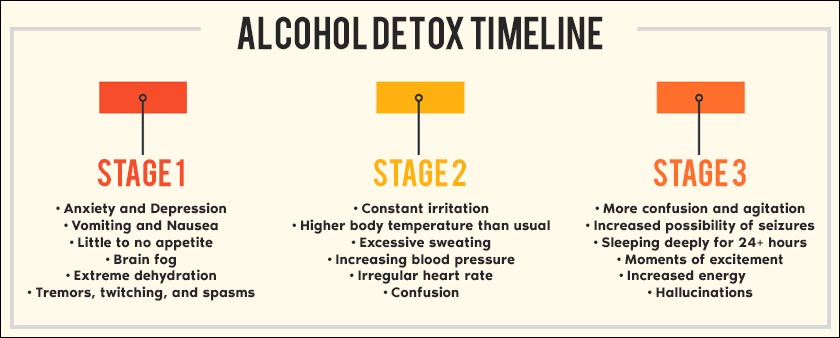Of the 2,200 Americans that die from alcohol poisoning annually, three in four are adults between the ages of 35 and 64. The majority, which is 76% are white men.
When a person has a problem with alcohol, the effects don’t always play out the way you see in the movies. In fact, there are plenty of people who have drinking problems, yet still function well in their careers and home lives. Because of this, becoming educated about the dangers of extensive drinking is incredibly important. So, use this article as a guide to identifying the different types of alcohol abuse and details about the alcohol detox timeline.
Remember that treatment is around because it saves lives and makes room for rebuilding. Continue reading and we’ll tell you everything you need to know.
What Qualifies as a “Drinking Problem?”
When most people think of having a drinking problem, they picture a person who neglects their responsibilities to spend their days and nights getting drunk. While this is the case for some, it isn’t the same for others.
Problems with alcohol are actually complex. This is an issue that can present itself in different ways. They include binge drinking, alcohol dependence, and alcohol abuse.
Since this illness is progressive, it’s best to catch and treat it in its early stages. This is how you can tell which category of drinking a person falls into:
Binge Drinker
Did you know that there are 9 different types of binge drinkers? If this is your drinking style, it is normal for you to drink more than a safe amount in one sitting.
The number of drinks that place a person in this category is different for each gender. It’s four drinks for women and 5 drinks for men.
Even if you don’t drink daily, drinking this much can lead to many health complications including:
- Terrible memory and concentration
- Infertility
- Decreased brain function
- Issues with heart function
- Stroke
- Verbal learning problems
Binge drinking is an alcohol problem that often leads to more serious drinking habits like the alcohol abuse or dependence described below.
Alcohol Abuser
When a person continues to drink despite it causing problems in their life such as putting a strain on relationships, spending more money than they can afford, or missing a lot of work, they are considered an alcohol abuser.
Additional signs of alcohol abuse are:
- Problems maintaining healthy relationships
- Drinking more often than planned
- Cutting back on other activities just to drink
- Drunk Driving or DUI charges
- Indulging in riskier behavior
- Having been arrested
Alcohol abuse can affect all age ranges, but it is very common among younger people. It also comes with a great amount of denial.
Alcohol Dependence
It’s common for an alcohol abuser who doesn’t seek help to move on to a point of alcohol dependence. If you have been in this place, it’s likely that you’ve ignored enough of your own alcohol-related issues for it to really interfere with your health.
If you have alcohol dependence, you:
- Have become numb the effects of alcohol
- Drink more to stop the feelings of withdrawal
- Crave alcohol when it isn’t in your system
- Still drink even if it makes you depressed or anxious
- Are restless and struggle to fall asleep
When a person is fully dependent on alcohol, it is extremely difficult to kick the habit. At this level, the mind and body are equally addicted and dependent on alcohol.
The best way to safely recover at this point is to seek alcohol addiction treatment.
What is the Alcohol Detox Timeline?
The alcohol detox timeline can vary from one person to the other for quite a few reasons. They might include a person’s medical history, how long they’ve been abusing alcohol, and whether they’ve included other drugs in their abuse.
With that said, this timeline should be used as a general guide. It’s a good way to see how most people’s bodies would respond to detoxing if they were pretty healthy before the alcohol abuse.
The body’s natural ways of detoxing from alcohol are broken into three stages. We’ve included the signs and symptoms of each stage in this section.
First Stage
The symptoms a person may experience during the first stage of detoxing can include:
- Anxiety and Depression
- Vomiting and Nausea
- Little to no appetite
- Brain fog
- Mood swings with extreme highs and lows
- Extreme dehydration
- Tremors, twitching, and spasms
These symptoms start to present themselves between 6 and 12 hours after heavy drinking. It is common for people to drink to stop the agonizing symptoms during this first stage of detoxing.
Second Stage
Your body will experience a bit more stress during the second stage of detox, such as:
- Constant irritation
- Higher body temperature than usual
- Excessive sweating
- Increasing blood pressure
- Irregular heart rate
- Confusion
These symptoms can appear between one and three days after your last drink. This stage is best described by the shock the body goes into after the alcohol it “needs” has been taken away.
The organs may also start to show signs of breaking down at this point, but it depends on how much damage has been done as a result of drinking. The unexpected rise in the blood pressure and heart rate tend to bring on the most problems.
Third Stage
The following symptoms accompany the third stage of alcohol detox:
- Even more confusion and agitation
- Increased possibility of seizures
- Sleeping deeply for 24+ hours
- Moments of excitement and increased energy
- Hallucinations
It’s possible for this third stage to last for several weeks, but it usually appears roughly three days after the last drink. If treatment isn’t received, there is an increased possibility of psychological damage.
A life-threatening illness called delirium tremens can arise at this stage. Because of the severity, you need to call 911 right away if you experience any of its side effects.
Contact Us
The safest environment to detox from alcohol is in a treatment facility. In one, you will be surrounded by medical staff who will monitor your blood pressure, and heart while assisting you with medications if necessary.
To learn more about the alcohol detox timeline, recovery, and restarting your life on a healthier note, contact us today. You aren’t alone in your addiction.





